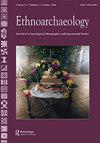Production and Exchange Networks of Cord-marked Pottery from Oinam Village in Manipur, Northeast India: An Ethnoarchaeological Perspective
IF 1.3
0 ARCHAEOLOGY
引用次数: 0
Abstract
ABSTRACTThe production of cord-marked pottery in the village of Oinam, located in the Indian state of Manipur, is practiced by the women potters of the Poumai Nagas, an Indigenous Tibeto-Burman ethnic community. A two-week ethnographic study was conducted in 2021 among the Poumai Nagas to document the dynamics of the production process and oral accounts of the potters and other villagers including residents from the non-pottery-producing Naga villages. While there is decreasing demand for earthen vessels today, the survey's outcome suggests a large exchange network and interaction in the Naga Hills centered on the pottery of Oinam. This network facilitated trade and fostered political and economic alliances among the Naga communities. The study also supports the claim of regional exchange networks in the region in the past and further documents that cord-marked pottery formed a significant trade item.KEYWORDS: Ethnoarchaeologycommunity-based researchcord-marked potteryPoumai NagasNaga HillsManipurNortheast Indiatradetradition AcknowledgmentsI want to thank Bowang Kho and Dr. Nathan Kho from the village of Oinam for their help and support during the research. Thanks are also due to the villagers of Oinam for their keen support during my field survey. I also extend my thanks to the anonymous reviewers for providing their insightful comments on the earlier draft of this paper. All illustrations and photos are by the author unless otherwise noted.Disclosure statementNo potential conflict of interest was reported by the author(s).Additional informationFundingI received no funding for the research presented in this article.Notes on contributorsOinam Premchand SinghOinam Premchand Singh is an assistant professor in the Department of History at Mangolnganbi College in Manipur, India. He holds a doctorate degree (2023) in archaeology from Jawaharlal Nehru University, New Delhi. His Ph.D. work was on megaliths in the Naga Hills of Manipur. He also has a keen interest in visual anthropology and has conducted archaeological and ethnographic surveys in the Naga-inhabited areas of Manipur.印度东北部曼尼普尔Oinam村绳纹陶器的生产和交换网络:一个民族考古学的视角
【摘要】在印度曼尼普尔邦的Oinam村,布迈纳加(Poumai Nagas)的女陶工生产绳纹陶器。2021年,在Poumai Naga村进行了为期两周的民族志研究,以记录生产过程的动态以及陶工和其他村民(包括非制陶纳加村的居民)的口头叙述。虽然今天对陶器的需求有所减少,但调查结果表明,在纳迦山,以奥纳姆的陶器为中心,存在着一个庞大的交换网络和互动。这个网络促进了纳迦社区之间的贸易,并促进了政治和经济联盟。这项研究还支持了该地区过去存在区域交换网络的说法,以及进一步的文献表明,绳纹陶器是一种重要的贸易物品。关键词:民族考古,社区研究,标记陶器,波迈,NagasNaga山,曼尼普尔,印度东北部,传统致谢我要感谢来自Oinam村的Bowang Kho和Nathan Kho博士在研究过程中的帮助和支持。同时也要感谢Oinam的村民们在我实地调查期间给予我的热心支持。我还要感谢匿名审稿人对本文早期草稿提供的有见地的评论。除非另有说明,所有插图和照片均由作者提供。披露声明作者未报告潜在的利益冲突。附加信息:我在本文中所做的研究没有得到任何资助。作者简介:hoinam Premchand Singh是印度曼尼普尔Mangolnganbi学院历史系的助理教授。他于2023年获得新德里贾瓦哈拉尔·尼赫鲁大学(Jawaharlal Nehru University)考古学博士学位。他的博士论文是关于曼尼普尔纳迦山的巨石。他还对视觉人类学有着浓厚的兴趣,并在曼尼普尔邦的那加人聚居区进行了考古和民族志调查。
本文章由计算机程序翻译,如有差异,请以英文原文为准。
求助全文
约1分钟内获得全文
求助全文
来源期刊

Ethnoarchaeology
ARCHAEOLOGY-
CiteScore
1.60
自引率
0.00%
发文量
10
期刊介绍:
Ethnoarchaeology, a cross-cultural peer-reviewed journal, focuses on the present position, impact of, and future prospects of ethnoarchaeological and experimental studies approaches to anthropological research. The primary goal of this journal is to provide practitioners with an intellectual platform to showcase and appraise current research and theoretical and methodological directions for the 21st century. Although there has been an exponential increase in ethnoarchaeological and experimental research in the past thirty years, there is little that unifies or defines our subdiscipline. Ethnoarchaeology addresses this need, exploring what distinguishes ethnoarchaeological and experimental approaches, what methods connect practitioners, and what unique suite of research attributes we contribute to the better understanding of the human condition. In addition to research articles, the journal publishes book and other media reviews, periodic theme issues, and position statements by noted scholars.
 求助内容:
求助内容: 应助结果提醒方式:
应助结果提醒方式:


